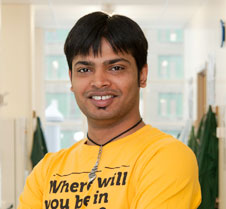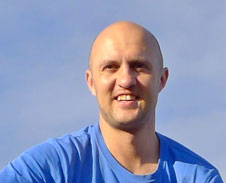University of Otago-based up-and-coming scientists Drs Aniruddha Chatterjee (Pathology, Dunedin) and Alex Gavryushkin (Computer Science) are among the latest recipients of the prestigious Rutherford Discovery Fellowship.
These much sought-after fellowships, of which only ten are given each year across all research disciplines of science, arts and engineering, support New Zealand's most talented early- to mid-career researchers for a five-year term.
The Rutherford Discovery Fellowships, administered under the Royal Society Te Apārangi, aim to allow researchers to develop a research group and programme around a particular topic, and are designed to ensure they establish themselves as contributors to and future leaders of New Zealand's research community. The Fellowships are valued at $160,000 per year.
Their programmes, which involve taking advantage of state-of-the-art scientific techniques and multidisciplinary approaches, are titled:
Investigating the origin and consequences of epigenetic alterations in cancer metastasis
Dr Aniruddha Chatterjee
$800,000 over five years
Online algorithms in evolutionary biology
Dr Alex Gavryushkin
$800,000 over five years
Dr Aniruddha Chatterjee: Investigating the origin and consequences of epigenetic alterations in cancer metastasis

Dr Aniruddha Chatterjee
Dr Chatterjee is an expert in epigenetics, molecular biology and the bioinformatics analysis of next generation sequencing data.
His fellowship will allow him to establish and head a major research programme and build a leading laboratory in epigenomics. This field of study focuses on DNA modification that alters gene function without changing the DNA sequence or letters of the genes themselves.
He says he regards gaining the fellowship as a fantastic outcome – “I am very thrilled to get this premier fellowship from the Society.”
Dr Chatterjee explains that many people are working on primary cancer (when a tumour remains in its site of origin) while others are working on how such cancers are able to invade other parts of the body.
“My research aims to join these important stages of cancer together to work out the whole story about why, and how, a primary cancer cell spreads in the body and becomes fatal.
“I will use cutting-edge epigenomic tools, single-cell level analysis on tumour cells from a patient's blood, and modern molecular manipulation methods to answer this fundamental question.
“I am very grateful to my post-doctoral mentor Professor Mike Eccles, my fantastic team and students and collaborators (particularly Drs Peter Stockwell and Euan Rodger) and the Department of Pathology for the tremendous support which enabled me to walk on this road of being a laboratory head and obtain this prestigious fellowship.”
Biography:
During Dr Chatterjee's PhD research, he pioneered the first analytical pipeline for large-scale DNA methylation analysis in Australasia and documented some of the first DNA methylation maps in human tissues and zebrafish. He was awarded his PhD in 2013 from the University of Otago, and has subsequently worked as a New Zealand Institute for Cancer Research Trust funded Research Fellow in the Department of Pathology at the University of Otago. His work in this period enabled detection of aberrant methylation and microRNA patterns in melanomas and hepatoblastomas and development of new cancer epigenomic analysis tools.
He is also an affiliate investigator for the Maurice Wilkins Centre, China-New Zealand Health Research Centre and the National Science Challenge programme, Healthier Lives. He has received many awards, including the prestigious Illumina Emerging Researcher Award in 2015 and the young investigator award from the Australian Genomic Research Facility in 2011. Dr Chatterjee is excited to be part of the 'next generation' of Kiwi scientists that are able to use their skills, networks and the unique advantages of New Zealand to lead a world-class research programme.
Research programme summary
Cancer is a leading cause of illness and death worldwide. Metastasis (the spread of cancers to distant organs) is responsible for about 90 per cent of cancer-related deaths, and yet the question of what causes primary cancer cells to become metastatic is still unsolved.
While we have now identified many genetic causes of primary cancers, genetic mutations do not appear to be a causal factor for metastasis. This indicates that DNA modifications that do not directly alter the DNA sequence but instead changes the frequency by which a cell uses specific genes (termed epigenetic modifications), are important in influencing how metastatic cancer cells behave.
In his research programme, using a “Discovery to Function approach”, Dr Chatterjee proposes to identify the mechanism by which specific modifications of DNA alter primary cancer cells to become metastatic. He will identify changes in DNA modifications (e.g., methylation of DNA) and gene expression patterns between primary tumour cells, tumour cells circulating in the blood, and metastatic tumour cells from the same individuals to work out the epigenetic origin of metastasis. Using state-of-the-art epigenomic tools such as single cell level analysis of tumour cells and new epigenetic editing, he will identify drivers of tumour metastasis and specifically engineer these “epigenetic drivers” in model laboratory systems to determine how these changes decipher cancer cell function.
This research will establish new methods and capability in New Zealand to investigate epigenetic patterns in cancer. The research will furthermore help to answer fundamental questions about the mechanisms responsible for the development of cancer metastasis. In the long term, this work has the potential to improve the way we diagnose, prognose and treat cancer.
Contact:
Dr Aniruddha Chatterjee
Email aniruddha.chatterjee@otago.ac.nz
Dr Alex Gavryushkin: Online algorithms in evolutionary biology

Dr Alex Gavryushkin
Dr Gavryushkin will come to take up a post at Otago's Department of Computer Science fromSwitzerland, where he is currently a Research Fellow in the Department of Biosystems Science and Engineering at ETH Zurich. His research interests are in mathematical and computational genomics.
He says he feels very excited and overwhelmed by the plethora of opportunities that the
Rutherford Discovery Fellowship opens up for him. “I chose Otago because I believe my planned investigations and the work being done here (in genomics, mathematical and computational biology,and biomedicine) will complement each other in a synergistic way.
“Hence I believe that I will be able to fulfil the objectives of my research programme in the most efficient way possible. The biomedical component of the recently launched Government initiative Genomics Aotearoa is centred around the Dunedin School of Medicine. I believe that the knowledge and skills that my group and I will bring are of high value for Genomics Aotearoa and I'm very excited about the prospects of this collaboration.
Dr Gavryushkin adds that his Rutherford proposal is a highly multi-disciplinary research programme.
“To successfully achieve the goals of the research, we need a fertile interdisciplinary environment, with mathematicians, computer scientists statisticians,and biologists (including students and postdocs in these disciplines) all working together. This is something that is very hard to achieve in the often conservative department- and lab- based system.
“My new programme will allow me to create a network of researchers from the diverse range of areas working together towards the common goal of answering the big genomic questions, fundamental to biology and biomedicine.
Ultimately the promising idea is to develop data-scalable computational biology methods that can handle data changes in an effective way.
Biography
Dr Alex Gavryushkin conducts research within the area of mathematical and computational genomics. In 2009 he completed a PhD in mathematics at Novosibirsk University (Russia).
Alex's subsequent research in theoretical computer science, focused on computational methods and online algorithms, was funded by a Government of Russia Doctor of Science Fellowship and a research grant from the University of Auckland. Alex used these prestigious awards to develop the mathematical and algorithmic fundamentals necessary for the online evolutionary analysis of large molecular sequence data, while at the University of Auckland. This work led Alex to Switzerland, where he took up a Research Fellow position in the Department of Biosystems Science and Engineering at ETH Zurich (2016). Alex will now return to found a research group working on data-scalable computational methods in biology and biomedicine at the Department of Computer Science at University of Otago, an institution at the heart of New Zealand's biomedical community.
Research programme summary
Evolutionary analysis of large molecular sequence data is widely employed throughout modern biology, medicine, and pharmacology. Thanks to next generation sequencing technologies, thousands of whole genome sequences are constantly produced at low cost. Today's computational methods and technologies are barely prepared to analyse the huge amount of data produced and answer basic biological questions in a statistically sound way. As a result many big data sets are analysed with simple and inappropriate models, or using approximations that may produce inaccurate inferences. The roots of the problem lie in our lack of understanding of fundamental mathematical principles that form the grounds for evolutionary analysis of data.
The pressing need to develop effective computational methods that can accurately analyse big data under appropriately complex evolutionary models constantly requires new algorithmic ideas as well as solutions of standing computational challenges. The ever-accelerating pace at which molecular sequence data is produced in the modern world makes it impractical to rerun all analyses every time new data arrives or existing data is refined. This motivates research on so-called “online” computational biology algorithms capable of integrating new data as it appears. Such algorithms enable data-scalable methods in evolutionary analyses of molecular data.
In this research programme Dr Gavryushkin will develop mathematical, statistical, and computational machinery for evolutionary analysis of 'omics' data, with a specific focus of enabling such online algorithms. He and his research team will apply methods from modern branches of computational geometry, data science, and computer science to enhance statistical and computational performance of evolutionary approaches used in epidemiology, cancer research, ecology, and pharmacology. Specifically, they will develop efficient online methods.
Contact:
Dr Alex Gavryushkin
Email alex@gavruskin.com
For more information contact:
Simon Ancell
Communications Office
University of Otago
Tel +64 3 479 5016
Email simon.ancell@otago.ac.nz
A list of Otago experts available for media comment is available elsewhere on this website.
Electronic addresses (including email accounts, instant messaging services, or telephone accounts) published on this page are for the sole purpose of contact with the individuals concerned, in their capacity as officers, employees or students of the University of Otago, or their respective organisation. Publication of any such electronic address is not to be taken as consent to receive unsolicited commercial electronic messages by the address holder.
